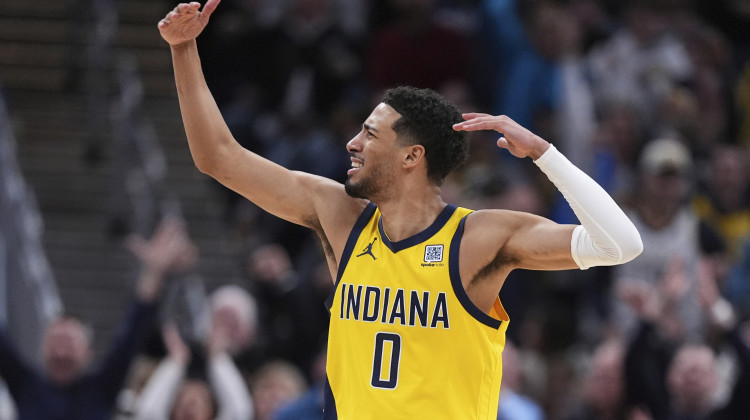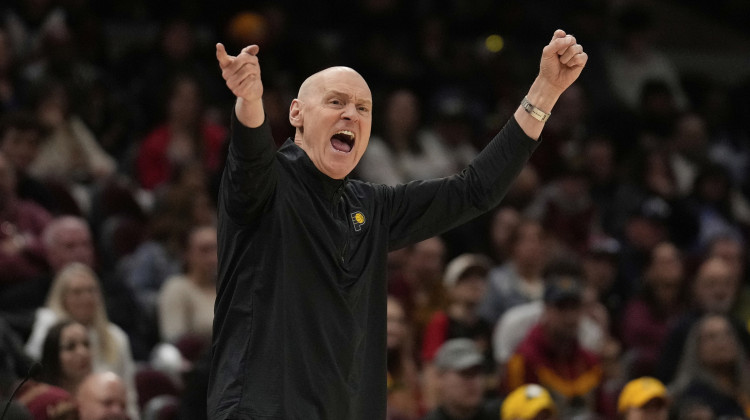The American south has been a hostile place for Black people for much of this country's history. In the 1840s, some Black families decided to look for something better. They undertook a dangerous journey to the north and west to Indiana, and one of the most notable places where they settled was in Grant County, northeast of Indianapolis. Two of the families who ended up there were the Weavers and the Pettifords. The families and their descendants are the subject of the documentary “Rooted In Love, Lifted in Strength” from Loving Life Productions.
LaKesha Lorene is the producer of the documentary, and Charo Speikes-Boyd is president of the Pettiford-Weaver Family Trust. They spoke to WFYI’s Ray Steele about the family’s legacy and an upcoming screening of the documentary at the Spirit & Place Festival in Indianapolis.
RAY STEELE: Charo, it may be hard for us to understand just how dangerous it was for these families, these people to make that journey in the 1840s.
CHARO SPEIKES-BOYD: Definitely, you know, Ray, it was a freedom move. They moved from North Carolina in order to preserve their freedom. And again, they settled in Liberty Township, which was an abolitionist settlement in Grant County, Indiana, around the 1840s.
STEELE: Was that, why they went there? They knew it was an abolitionist settlement because I read that there were Quakers nearby. The Quakers of that time were very much anti-slavery.
SPEIKES-BOYD: Absolutely. Weaver was established near the Quakers who were known for their strong anti-slavery views, and they helped to establish that community. And this community ended up thriving, it didn't just survive.
STEELE: It's amazing that it survived that it was started in the first place. But it was a very vibrant place for these families in this community for a very long time.
SPEIKES-BOYD: Absolutely. In the 1870s and 1880s, Weaver reached his peak with a population of nearly 2000. Ray, they had a church, they had schools, they had a blacksmith shop, store, post office, a horse racing track, and even a cemetery that remains today, as where many of our family members were buried. It's just a remarkable story.
STEELE: I imagine as a filmmaker, LaKesha, a remarkable story to tell, again, considering how… yes, Indiana was not a slave state back then. But there were a lot of Confederate sympathies in Indiana It could not have been easy for them to survive all those years like that.
LAKESHA LORENE. I know, the bravery, the innovation, the resilience, and then the love of this family. That really, they have so much history, not only in the area of their settlement, but all throughout the state. So, I joke around sometimes now that if you meet a Weaver or Pettiford, it's from this family, and I'm actually serious about it. So what was really amazing and fun to discover throughout this documentary was not only that historic land, you know, their journey to reclaiming their land, but also the significant contributions that his family has made, specifically in education in the state with the late Dr. Herbert Miller, and so many other members of their family that have done just amazing things for the Black community, and their greater communities in the state. So it was, it was pretty mind blowing, to discover that history through the documentary and then to be personally empowered and inspired by their story, because so many of us from African American descent, we don't know, decades and centuries back, you know, so, you know, Miss Norma Johnson, the family Grio, has all of this history from the 1800s. It’s pretty mind blowing. So, we're really excited for people to see their story.
STEELE: And I love documentaries like this. It’s one of those pieces of history, one of many in this country, about this country, about the formation of this country, particularly as it pertains to Black Americans that's not taught in schools. It's especially not taught to us white people, let's just be honest. And this is how we learn the true history of the country.
LORENE: Yeah, Black settlements, the independence that we had, as a people for a nice amount of time in this country is never talked about. And that's, I believe, by design. Once you find that out about your history, whether it's your direct family or not, knowing that someone that looks like you owned a town and had post office and grocery stores and were self-sufficient and self-reliant, it gives you a different sort of empowerment, especially in today's society, for all of us, and again, specifically for Black Americans, but for anyone to say, okay, that was the American dream. How do we get back to that?
SPEIKES-BOYD: In 1919 My great great great grandparents Joseph and Martha Weaver Pettiford, they held their first PIP reunion. They had 19 children, 17 lived to adulthood, they had 19 c -- bless my great, great grandmother. And so you could imagine having that many children and desiring them to all come back and to fellowship. And so, they started the third Sunday in August, that first family reunion, and I'm so proud to say that we've been having those reunions consecutively for 104 years, we're looking forward to next year in 2024, where it would be our 105th.
STEELE: LaKesha, when did you decide to do this as a documentary? What was the spark – you are a filmmaker, and you do a whole lot of different things. What sparked you to say, I'm going to do this, I'm going to tell this story?
LORENE: I've been really fortunate right? To, to forgot to have aligned my path with so many great people. So, Christy Jones, who's an educator, and a dear friend of mine was telling me, we need to hire a filmmaker to do a family documentary of our family reunion. And then she started telling me about her family. And mind you, I've known Christy, for years. We met at North Central High School. And I did not know all of this about her family at the time. So, when she began to tell me about her family, and that they've had all of these like, 102 or so consecutive family reunions at the time when she talked to me about this documentary, I said, Oh, my goodness, consecutive, like every year? She said every year, and then she introduced me to, as I mentioned before, Miss Norma Johnson, and then Charo, and then you know, their committee and I was excited to do it. When she first told me about the history of the family. You don't come across, you know, kind of like a founding family that's have their own settlement every day, especially again, in this country, unfortunately, so much of that history is erased, not talked about, or people don't live as long anymore to share those stories. So yeah, the history, the pride that the family had and the love that they shared, I really wanted to help capture that for them, and to make sure that they had this because this is a family that documents things and that knows how important it is to preserve history. I wanted to do this for them. So, it was exciting to me that that Christy came to me about this project and that what this project means not only to this family, but really to our greater community.
STEELE: Charo, as the president of the family trust and of course member of the family, what is the legacy of the Pettiford-Weaver settlement to you personally? What are you leaving for the next generation?
SPEIKES-BOYD: Our legacy is so rich that I know I could not summarize it right now when I think about what we're leaving, I think about how awesome it was for us to have LaKesha do that documentary at that point, because that was when we were in the process of a court case, fighting to reclaim some land. And we won that case. And so, we now own 1.75 acres of land. We brought back that land in 2021. Just recently we greened back that land to where we put grass seed there. And our whole purpose for reclaiming that land was so that we could return the reunions back out to Weaver. And so that's the one of the legacies that we're leaving is having those reunions back here on our own land, which is huge. I definitely want to acknowledge Indiana Wesleyan and Taylor University. In 2017 and 2018, they did extensive research about our family land, I found out things I had never known as a child that Frederick Douglass and Sojourner Truth both came and spoke out at Weaver, and so that when I say the legacy is so rich, it's so deep. I'm so grateful for the knowledge and again, the legacy is family. It's that rooted in love that lifted in strength and being able to allow those that come behind us to know where we come from, who we come from, the great things that we can accomplish and then sharing that with others.
LORENE: And we are so grateful for the partnership of WFYI for this event. And Eastern Star Church and Pastor Jeffrey Johnson for partnering with us to get this screening shared with our community.
SPEIKES-BOYD: Absolutely. And Indiana Landmarks Black Heritage Preservation Program. They were a partner as well and so we just appreciate all the support because this could not be done without everyone coming together.
Charo Speikes-Boyd is a Pettiford-Weaver family descendant and president of the Pettiford-Weaver Family Trust, and LaKesha Lorene is the producer of the documentary on the family, “Rooted In Love, Lifted in Strength.” There's a screening of the documentary that's part of the Spirit & Place festival that's at Eastern Star Church on Thursday, November 9. You can find more information at wfyi.org/live.
 DONATE
DONATE







 Support WFYI. We can't do it without you.
Support WFYI. We can't do it without you.